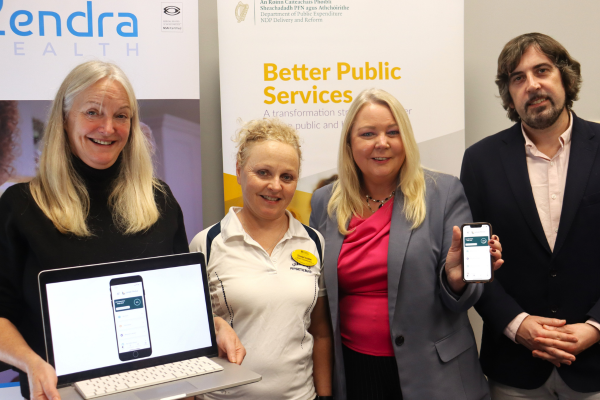New digital service launched for lymphoedema patients during Public Service Transformation Week 2024

Thursday, 24 October 2024: A NEW digital service, the ‘Lymph Active’ app launched this Wednesday to support lymphoedema patients, as part of Public Service Transformation Week 2024. The resource provides information and exercises to help reduce the risk of lymphoedema after cancer treatment.
The development of the service was supported by the Public Service Innovation Fund from the Department of Public Expenditure, NDP Delivery and Reform.
Highlighting the significance of this initiative, Damien McCallion, HSE Chief Technology and Transformation Officer, said, “The use of technology through the Lymph Active app is important to help patients access the right information at the right time to help them manage their condition. This is all part of the HSE’s plan under the government’s Digital for Care 2030 Framework. The support of the better public service innovation fund was a key enabler to enable this service to be delivered. I wish to acknowledge the exceptional collaborative work of the programme team and the provision of an invaluable service that manages patients’ conditions both in the community and acute services”
Kay Morris, Project Manager for the HSE Lymphoedema Services, explained, “The app provides links to HSE health and wellness programs that promote a healthy lifestyle. The app is available to clinicians to prescribe tailored exercises for clients who are at risk of developing or already affected by lymphoedema.”
The new digital resource will:
- suggest exercises and exercise tracking
- provide videos and tips
- has a symptom tracker to see if you need to contact your clinician
Sandra Broderick, Regional Executive Officer, HSE Mid West said, “The launch of the app here at University Hospital Limerick is another example the commitment of our specialist staff in helping patients manage this devastating complication of cancer surgery and treatment. The physiotherapy-led Lymphoedema Early Detection Service at UHL has in the last three years reduced the incidence of clinical lymphoedema from an expected 25% to under 2%. This remarkable achievement was made possible by empowering people to know their risk and how to manage their condition. The app is another example of how we can do this.”
Feedback has been positive, with patient Mandy Quirke sharing her experience: “This app is fabulous - I have learned so much from it. The information is so clearly laid out: what lymphoedema is, the risk factors, how to prevent it and how to deal with it if it occurs. Usually, when you're told to exercise, that's it - you're left to source the exercises yourself. This app has it all clearly laid out in a very can do way.”
Lymphoedema explained
Lymphoedema is a chronic condition that causes swelling in the body's tissues. It can affect any part of the body but usually develops in the arms or legs. Patients affected by cancer can develop lymphoedema after lymph node removal during their treatment.
Around 15,000 people in Ireland are living with lymphoedema. Primary lymphoedema is rare. It may affect around 1 in 6,000 people. Secondary lymphoedema is more common. Secondary lymphoedema affects around:
- 2 in 10 people with breast cancer
- 5 in 10 people with vulval cancer
- 3 in 10 people with penile cancer
People who have treatment for melanoma in the lymph nodes in the groin can also get lymphoedema. Your treatment team will tell you if your cancer or cancer treatment could cause lymphoedema.
For more information and resources visit hse.ie/lymphoedema

